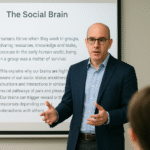Let’s recap the content of modules 5 and 6 and I’ll add some insights that I found interesting about the content of these weeks.
- Ariely Discussion on Why Otherwise Honest People Sometimes Think it is OK to Steal
In TED, it is shown that people cheat to maintain their self-image. The talk deals with the subject of predictable irrationality, which leads to poor decision-making. Ariely talks about her experience in the hospital, where there is a disconnect between intentions and what actually happens. Cheating behavior is more common than we imagine; there are many more individuals committing small betrayals than a small group of people committing a major fraud. This concept can be explained by the fudge factor, where people rationalize their actions to maintain self-image. Social influences and personal ethics can influence the habit of cheating. Experiments show that a group can encourage or discourage dishonest actions. When a person sees another person cheating, or when there is a distance from money (for example: taking a pen that belongs to the office, because the person does not associate the pen with the money spent, for example).
- Ariely Chapter 6 – cheating ourselves
The chapter shows how we deceive ourselves into self-deception so that we can cheat without feeling guilty. We cheat to feel moral, even when acting dishonestly. The concept of “fudge factor” explains why people commit small acts of dishonesty without compromising their self-image. The role of motivated reasoning is shown, as we ignore evidence that conflicts with our desired self-perception, which makes cheating easier.
- Ariely Chapter 7 – creativity and dishonesty
Ariely says that creativity has a certain link with dishonesty, because according to him, creative people are better at constructing narratives to justify unethical behavior. People can use creativity to reinterpret facts in their favor, causing them to cheat while maintaining a good self-image.
- Ariely Chapter 8 – cheating as infection
Dishonest behavior can be “contagious.” Just as we catch a virus from others, we can be more dishonest if we are in an environment where there is more dishonesty. The chapter discusses the “Broken Windows Theory,” which states that visible signs of small rule-breaking can lead to more serious unethical behavior. When dishonesty is normalized in a social group, it is easier for individuals to justify their own cheating.
- Ariely Chapter 9 – collaborative cheating
People tend to cheat more when they are in groups. Collaborative efforts dilute individual responsibility, making it easier for people to engage in dishonest actions. When cheating benefits the group, people feel less guilty about their dishonest actions.
- Wikipedia Article on Rent Seeking
Rent-seeking is the process of increasing wealth by manipulating politics and society without generating new wealth as a result. This behavior reduces efficiency in the economy, encourages negative things like corruption and diminishes public trust. How this can happen: maintaining monopolies and creating regulations that discourage the entry of honest competitors into the market. The term originated in the 19th century through economist David Ricardo. Rent-seekers extract value from others without contributing to productivity, which is different from profit-seekers who help create wealth. Some current examples of rent-seekers are corrupt politicians, lobbyists and those who strangle the free market through barriers. The Tullock paradox shows that rent-seekers have a low cost compared to the benefits they can gain by manipulating the system.
- Todd Zywicki. Rent-Seeking, Crony Capitalism, and the Crony Constitution. University of Chicago Press, 2016
Todd Zywicki shows the relationship between rent-seeking and crony capitalism, and how this dynamic affects economic and political systems, with an emphasis on the United States. In this system, the government, large corporations, and interest groups collaborate to benefit each other. Companies can receive subsidies and trade protections, and in return, these companies help the government’s political goals. The result is an inefficient economy and an erroneous allocation of resources. The 2008 crisis exposed crony capitalism in the country. The government “rescued” several companies, such as General Motors and banks, for political reasons, and distributed benefits to interest groups such as labor unions. Crony capitalism leads to inefficiency, reduces competitiveness, and creates an environment in which political networks are more important than market success. The paper is skeptical, not believing in profound reforms to revoke the existence of this system, since large corporations and political parties benefit from it.
- Ariely: TED talk about our moral code
Ariely shows how our moral intuitions can be flawed. He says it is important to test our assumptions and intuitions through a system of experimentation. He tells the story of when he had burns and ended up in the hospital, he could not find the right dressing removal technique to minimize the patient’s pain, so he came up with the insight to study irrational behaviors. Cheating behavior is not restricted to a small number of people, many people have a tendency to lie taking into account the ‘fudge factor’, which guarantees a little dishonesty, but still maintains a positive self-image. Some social and environmental elements can influence the degree of dishonesty. The ‘fudge factor’ affects areas such as business, personal life and political decisions.
- Wharton Blog Interview with Ariely
In this interview, Ariely once again says that small acts of betrayal are more common than major fraud, and that clear ethical guidelines are necessary. Dishonesty is common in organizations, especially small acts that are not noticeable. Bad behavior is more observed than good behavior, which can contribute to normalizing the process of cheating, and small violations can lead to larger violations. Unclear rules of conduct can lead to bad behavior. Clear rules can mitigate rationalization and reinforce ethical conduct. Whistleblowers are people who report unethical behavior, and organizations must have mechanisms to protect them.
- Mazar, Amir & Ariely (2008 article)
The paper explores how people reconcile the fact that they benefit from being dishonest with the fact that they maintain a positive image, even when behaving unethically. There are two factors that explain this behavior: inattention to moral standards and categorization malleability.
Inattention to Moral Standards is when a person does not actively focus on their internal moral standards when acting dishonestly. An example from the paper is when someone declares the value of taxes slightly lower, so they have a financial gain without thinking much about it.
Categorization malleability: flexibility to interpret an action to feel less dishonest. For example: when a person works long hours and says that they see no problem in doing something, or taking a pen from the company.
The researchers did some experiments and found that paying attention to moral standards reduces dishonesty, while opportunities through categorization (example: cheating for tokens instead of money) increases dishonest behavior. In traditional economics, dishonesty is seen purely as a rational cost-benefit, but in reality, it is something more complex.
Making moral standards more noticeable and reducing categorization flexibility can effectively reduce dishonesty.
Contribution Points Considering the learning from this week’s reading and materials. I would like to share some insights:
Regarding the forum question, I will give a personal analysis of the jobs I have had. In addition, a geopolitical analysis of governments.
I have worked in a government company in Brazil, where people did not pay much attention to ethics, because it was a more stable job, people did not care much about breaking certain rules, such as taking a pencil or pen from the storeroom for personal use. This behavior, as shown in the material studied, can generate more serious deviations of cheating. It is even worse when the leader behaves badly or does not say anything if he knows something is wrong. I have worked in a private company that provided services to the government, this company was very concerned about cheating, because if something wrong happened, the company would lose the contract and could no longer provide services to the public sector. The company held compliance meetings from time to time to discuss what it could and could not do, it was forbidden to accept gifts from suppliers, there was an anonymous reporting channel, we received a booklet on the code of ethics, so when something is at stake, the concern is much greater.
Making a geopolitical analysis of the Forum’s question: In order for us to have an idea of what is good or bad for society, we need a solid foundation in education so that the population is more aware of the world around them. Scientific knowledge should guide decisions in regulations. Practical examples: Europe prohibits several chemical components in food that can be harmful to health, while the United States is more liberal in this requirement, probably to defend industries supported by lobbies. Several countries, including France, Mexico and Brazil, require companies to state on the labels whether the product contains any component that is harmful to health, such as excess sugar, fat and salt, while the United States does not work with this type of regulation. Even though the United States is a developed country, compared to other developed countries, life expectancy is lower than in countries like Canada, Iceland, and Germany. One of the reasons is possibly the issue of nutrition. By comparing the quality of your country with other countries, you can get an idea of whether regulators are acting for the public good. An interesting way to think about it is to see what countries with the highest GDP per capita are doing to generate wealth and ensure the wealth of the nation. The ideal in the capitalist system is free trade, but internally within countries, the country wants to protect “national champions”, making it difficult for foreign competitors to enter and preventing the emergence of internal and external competitors. These companies help certain politicians and interest groups, and in return they receive “protection”, a regulation that creates a high barrier to entry for new competitors. Lobbyists are well known, and Brulle’s work (2018) shows that: “16-year period from 2000 to 2016, more than $2 billion was spent on climate lobbying.” Let’s think about the oil sector. Many countries only allow national companies to operate in the sector, causing corruption and inefficiency in many cases. One example is PDVSA in Venezuela. Even though the country has the largest oil reserves in the world, current production is low compared to the country’s capacity. An example of a major entry barrier is China, which does not allow many American companies to enter its local market to give space for Chinese companies to develop, such as Weixin, Weibo, DiDi, etc. Is the best way to do this? To prevent the capital produced in the country from going abroad? It is a very complex issue.
References
- About successful state lobbying campaigns: 4 examples of strategies to shape policy outcomes. (n.d.). Bloomberg Government. https://about.bgov.com/brief/successful-state-lobbying-campaigns-4-examples-of-strategies-to-shape-policy-outcomes/
- Brulle, R. J. (2018). The climate lobby: a sectoral analysis of lobbying spending on climate change in the USA, 2000 to 2016. Climatic change, 149(3), 289-303.
- Central Intelligence Agency. (n.d.). Life expectancy at birth: Country comparison. The World Factbook. https://www.cia.gov/the-world-factbook/field/life-expectancy-at-birth/country-comparison/
- CBS News. (2023). U.S. food additives banned in Europe making Americans sick, expert says. https://www.cbsnews.com/news/us-food-additives-banned-europe-making-americans-sick-expert-says/
- Connexion France. (2024). France will change its Nutri-Score food ranking system. https://www.connexionfrance.com/news/france-will-change-its-nutri-score-food-ranking-system-here-is-how/123341
- Energy Information Administration. (n.d.). Venezuela: Country analysis. https://www.eia.gov/international/overview/country/ven
- Investopedia. (n.d.). Lobbying. https://www.investopedia.com/terms/l/lobby.asp
- OpenSecrets. (n.d.). Top spenders on federal lobbying. https://www.opensecrets.org/federal-lobbying/top-spenders
- Worldometers. (n.d.). Oil reserves by country. https://www.worldometers.info/oil/oil-reserves-by-country/
Week 5 – Review: Ariely’s Honest Truth About Dishonesty – Chapters 6-10:
Ariely’s Honest Truth About Dishonesty – Chapters 6-10:
- Cheating ourselves: Self-Deception and Dishonesty. • Creativity and Dishonesty. • Cheating as an Infection: How We Catch the Dishonesty Germ. • Collaborative Cheating: Why Two Heads Aren’t Necessarily Better Than One. • Ariely’s Semi-Optimistic Ending: People Don’t Cheat as Much as One Might Expect.
Key Readings & Course Material:
- Ariely’s Honest Truth, Chapters 6-10
Additional Suggested Material:
- Ariely on Why Otherwise Honest People Sometimes Think it is OK to Steal: https://www.youtube.com/watch?v=nUdsTizSxSILinks to an external site.
- Ariely’s blog (note you may have to browse the blog a bit to access to his podcasts, etc.): https://danariely.com/
Week 6 – Review: Implications of Ariely’s Arguments for Business, Government, and Society
Implications of Ariely’s Arguments for Business, Government, and Society:
- What can business do to promote honesty within itself and in dealing with customers and the public. • Government Corruption and Rent Seeking. • Who guards the guardians?
Key Readings & Course Material:
- Ariely’s Honest Truth, Full Book
- Wikipedia Entry on Rent Seeking (https://en.wikipedia.org/wiki/Rent-seekingLinks to an external site. )
- Zywicki’s Rent-Seeking, Crony Capitalism, and the Crony Constitution (https://www.journals.uchicago.edu/doi/epdf/10.1086/686473Links to an external site. )
Additional Suggested Material:
- https://www.transparency.org/files/content/corruptionqas/Political_corruption_topic_guide_2014.pdfLinks to an external site. )
- Ariely on Why Otherwise Honest People Sometimes Think it is OK to Steal: https://www.youtube.com/watch?v=nUdsTizSxSILinks to an external site.
- Wharton Blog Podcast Interview with Ariely (https://knowledge.wharton.upenn.edu/article/dan-ariely-dishonestys-slippery-slope/Links to an external site. )
- Mazar, Amir & Ariely (2008) “The Dishonesty of Honest People: A Theory of Self-Concept Maintenance” Journal of Marketing Research 45(6)
- Ariely’s blog (https://danariely.com)


